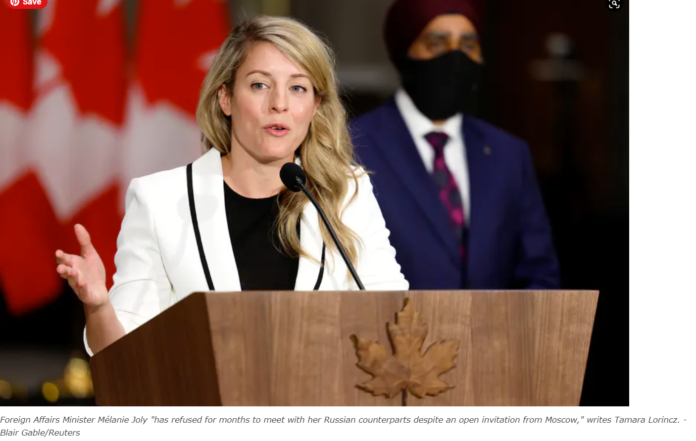Halifax native Tamara Lorincz is a PhD candidate, Balsillie School of International Affairs, Wilfrid Laurier University, and a fellow with the Canadian Foreign Policy Institute
As the crisis between the North Atlantic Treaty Organization (NATO) and the Russian Federation over Ukraine escalates, Canada is making the situation much worse.
On her trip to Europe last week, Foreign Affairs Minister Mélanie Joly met with representatives from the Kyiv government, NATO and the European Union, but rebuffed officials from Russia.
Joly, Canada’s top diplomat, has refused for months to meet with her Russian counterparts despite an open invitation from Moscow.
She has also ignored Russia’s concerns about NATO expansion and declared Canada’s support for Ukraine’s membership in the nuclear-armed military alliance.
Since 1999, NATO has brought in 14 new members from Eastern Europe, despite promises to Russia that the alliance would not move closer to its border.
These assurances against NATO expansion were made between Washington and Moscow at the end of the Cold War and during the Clinton administration and revealed by the U.S. National Security Archives.
Yet, at its 2008 Bucharest Summit, NATO declared its intention to bring Ukraine and Georgia into the alliance, blatantly disregarding Russia’s security concerns.
Then, the Obama administration worked with right-wing Ukrainian opposition parties and ultra-nationalist organizations to overthrow the democratically-elected government of Viktor Yanukovych in 2014.
Yanukovych did not support NATO membership, because it would undermine the country’s constitutional commitment to neutrality and antagonize its Russian neighbour and key trading partner.
It would also mean expensive, onerous military and economic reforms that were not in the best interests of the Ukrainian people. The toppling of the Yanukovych led to civil unrest and division in the country.
Evidence of U.S. involvement in the coup was exposed in a leaked telephone conversation between the American Assistant Secretary of State, Victoria Nuland, and the U.S. Ambassador to Ukraine Geoffrey Pyatt.

It is not “Russian aggression,” as Joly claims, but the U.S.-backed coup in Ukraine and NATO expansion into Eastern Europe, which are main drivers of the current conflict.
Shamefully, Canada has exacerbated this crisis, which has led to thousands of civilians being injured, killed and displaced within Ukraine.
Over the past seven years, Canada’s military involvement has aggravated tensions with Russia and intensified the civil war between forces loyal to Kyiv and the ethnically Russian Donbass region of eastern Ukraine.
Since 2015, under Operation UNIFIER, Canada has deployed over 200 soldiers on rotation to train and equip over 30,000 Ukrainian security forces. Joly met with some of these soldiers while she was in Ukraine.
However, a study last year by George Washington University revealed that Canada and other NATO countries are training the neo-Nazi Azov battalion, an extreme right-wing force that has been integrated into Ukraine’s military.
This month, the Trudeau government has sent more Canadian special forces, which are elite secretive combat soldiers, to Ukraine.
Canada has just deployed a warship, HMCS Montreal, from Halifax to the Black Sea to join allied navies off Russia’s coast.
Trudeau has also placed on high readiness Canada’s battle group in Latvia with its snipers and tanks. For eight years, Canada has been leading NATO’s enhanced forward presence in the Baltic country that borders Russia.
Canada is not ruling out sending more lethal weapons to Ukraine. Five years ago, the Trudeau government added Ukraine to the Automatic Firearms Country Control List. This has allowed Canadian companies to export millions of dollars worth of automatic guns and ammunition.
To enable Ukraine to buy more weapons from NATO countries, Finance Minister Chrystia Freeland announced that Canada would provide a $120-million loan to the Kyiv government.
With more weapons and soldiers in Ukraine, Canada and other NATO countries are subverting the Minsk Agreements. These agreements negotiated several years ago with all the key parties included a ceasefire and a withdrawal of all foreign forces from Ukraine.
Canada and NATO are dangerously militarizing the conflict and risking a violent confrontation with Russia. They are also sidelining the Organization for Cooperation and Security in Europe (OSCE) and impeding a diplomatic resolution.
To stop this march to war, several Canadian civil society organizations and prominent activists and academics have released an open letter and petition calling on the Trudeau government to stop arming Ukraine, end Operation UNIFIER, support Ukraine’s neutrality, and negotiate with Russia through the OSCE. The statement and petition can be read at: www.foreignpolicy.ca/ukraine.



















